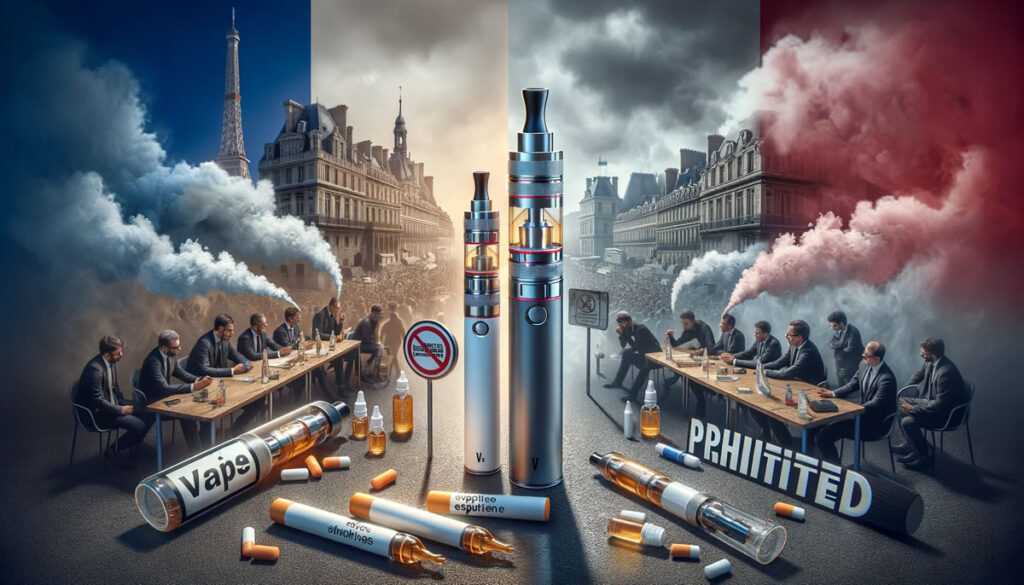France is set to ban the sale of disposable vapes, known locally as “puffs”, by the end of 2022. Announcing the policy in early September, Prime Minister Elisabeth Borne cited concerns that the compact devices are causing youth nicotine addiction and acting as a gateway to smoking.
Vaping advocates argue that the move contradicts population-level evidence on vape gateway effects. They suggest an ideological opposition to vaping is overriding public health interests, and warn the ban could perversely increase smoking rates.
Why Target Disposable Vapes?
Colorful, discreet, affordable disposable vapes have become hugely popular in France, especially among teenagers. Around 13% of 13-16 year old French students report having tried puffs.
Campaigners like the Alliance Against Tobacco claim the vapes' flavors, appearance and marketing deliberately target youth. "It’s become an epidemic,” says President Loïc Josseran. “The tobacco industry has set out to hook children."
With France's adult smoking rate still an alarming 35%, the gateway fears are understandable. But the population-level data suggests otherwise.
Contradicting the Gateway Theory
If disposable vapes were truly acting as a gateway to smoking among French youth, analysts would expect to see teenage smoking rates rising in tandem with increased youth vaping.
Yet as disposable vape use has surged across Europe, the United Kingdom, and New Zealand, youth smoking rates have plummeted. The inverse relationship contradicts gateway theory.
The fact some youths smoke and vape does not demonstrate vaping causes smoking. Common liability factors predisposing teens to experiment with nicotine probably explain most of the overlap.
One 2022 study concluded that while a minor gateway effect may exist, it is far outweighed by adults quitting smoking via vaping. Banning vapes could perversely protect cigarette sales.
Ideology Trumping Evidence?
With France’s smoking epidemic killing 75,000 people annually, safer nicotine alternatives should be encouraged, not removed.
Vaping advocates argue the government has provided no usage data on disposable vape consumers to justify limiting their choices. And no impact assessment was conducted pre-ban.
Sovape Vice-President Philippe Poirson believes an inherent opposition to vaping is overriding public health interests.
"The media uncritically promotes activist claims that puffs only appeal to youth, and will lead to smoking,” he told Filter Magazine. “It’s an evidence-free morality tale used to justify prohibition."
Real-World Impacts
Any benefits from marginally reducing youth vaping could well be outweighed by the ban's unintended consequences.
With safer, regulated vape options removed, ex-smoking vapers may return to cigarettes. And an illicit, unregulated puff market will likely emerge to meet residual demand.
Similar US city-level flavor bans saw no change in youth vaping, but significantly increased adult smoking rates as vapers were forced toward the black market or tobacco.
Vaping Works for Smoking Cessation
Banning vapes means removing tools that work. France's disposable models have helped many people quit smoking.
"I used to smoke a pack a day," says Paris resident Claude Bamberger. "But when I tried cigalike puffs, I forgot to smoke the cigarettes I'd bought."
Disposable vapes offered an easy introduction to vaping. For Bamberger and other ex-smokers now engaged in tobacco harm reduction advocacy, banning the products makes little sense.
Rather than prohibition, he believes France should focus on properly enforcing existing youth sales restrictions and expanding disposal/recycling options.
Perfect Solution Fallacy?
Some oppose disposables over environmental impact or safety concerns. But vaping advocates note that no nicotine product is completely without risks or downsides.
Compared to smoking’s carnage, low-risk trade-offs around youth uptake or waste seem reasonable to justify access for adult smokers. And illicit markets worsen risks.
ASH UK has warned that unregulated vapor products often contain dangerous contaminants and lack appropriate recycling programs. Pushing disposables into the shadows by prohibition could thus backfire.
Global Wave of Disposable Bans
Youth fears have sparked a wave of disposable vape bans globally, spanning Australia to Belgium and beyond. But Clive Bates, a leading tobacco harm reduction advocate, believes policymakers are severely overreacting.
He argues most youth vaping is experimental and frivolous, whereas for teens predisposed to smoking it can provide lifesaving harm reduction. Banning safer alternatives is illogical and dangerous.
“However uncomfortable,” Bates said, “we must acknowledge that harm reduction can start before age 18 for some.”
France's Uncertain Future
The impacts of France’s ban won’t be clear for some time. If enacted by 2022 as promised, regulators will hope to see plummeting youth vaping and smoking rates.
But vaping advocates expect little positive change. They predict surging black markets and stalled smoking declines as safer nicotine options disappear.
With ideology and prohibition defeating harm reduction, France's battle against smoking deaths seems set to suffer rather than progress. Banning the very tools that work makes for terrible public health policy.
Meet Nick Schager, the co-founder of our vaping website. With a solid foundation of over 10 years in the industry, Nick brings an unparalleled depth of knowledge, having an extensive understanding of more than 1000 vaping products.




